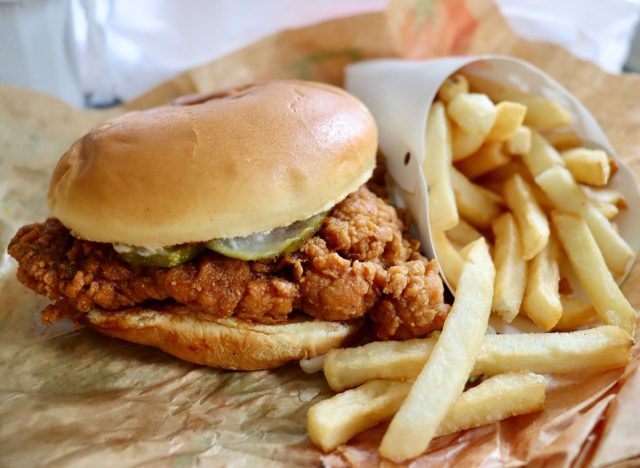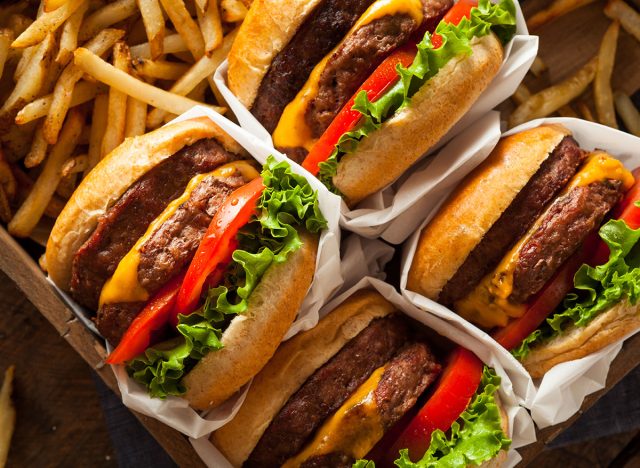6 Dangerous Side Effects of Eating Fast Food Every Day

Fast food seems to be on every corner—and Americans tend to love the quick, easy, and oftentimes inexpensive choices available. However, ordering high-calorie fast food regularly may not seem like the healthiest choice. As a registered dietitian (RD), I agree, especially when you're ordering over-hyped, large-sized items that are high in saturated fat, sodium, and added sugar. But what are the specific health effects of eating fast food every day?
Below you'll find six side effects if you choose to eat the typical large portions found at fast food establishments on a regular basis. This is not to say that choosing fast food on occasion and in small portions can't fit into your healthy eating plan. In fact, I spoke to one RD who did a one-month challenge at a popular fast-food joint and was able to fit this type of food into her healthy eating plan daily. You can find out how she was able to do that below.
How You Can Incorporate Fast Food Into A Healthy Eating Plan
Nicole Rodriguez, RDN, CDN, owner of Enjoy Food. Enjoy Life, did a challenge where she consumed fast food once per day for an entire month. She did so by giving herself a $5 per day budget to spend at the fast food establishment. In doing so, Rodriguez says "I learned that what most of us preach in the dietary space is true—moderation is key! Limiting yourself to $5 per day at any chain won't give you much of a caloric budget."
Rodriguez's philosophy is if you choose to have a fun meal once per day, it might make it easier to incorporate nutrient-dense foods at other meals. She recommends for those actively pursuing fat loss that this strategy might work better than trying to abstain fully from "empty" calories, as you may feel less deprived (as long as you're still maintaining a caloric deficit). "Moreover, one meal a day for thirty days, as part of an overall balanced diet and regular exercise program, is likely too short a time to have any significant detriment to your health. Surprisingly, after one month of carefully navigating the fast food menu at a popular establishment, her lipid panel actually improved.
However, while the outcome of this challenge is fascinating and shows us that with the right choices we can incorporate fast food into a balanced diet, this doesn't mean that everyone should go out and try this exact challenge. Instead, read on to see the potential side effects that may still occur from regularly eating fast food, and talk with your doctor or dietitian about the best type of eating plan for you and your personal health goals. And for more tips on how to choose healthier fast-food options, check out The 7 Healthiest Fast-Food Restaurants, According to Dietitians.
Side Effects of Eating Fast Food Every Day
You may increase your risk of stroke.

According to Rodriguez, "While fast food can fit as part of an overall balanced diet, consuming more than one daily meal on a regular basis will increase sodium intake." Rodriguez provides the example of a meal consisting of a double cheeseburger, small fries, and a small milkshake from one of the leading chains that contains more than 1,500 milligrams of sodium.
As the 2020-2025 Dietary Guidelines for Americans recommend no more than 2,300 milligrams of sodium per day (the equivalent to 1 teaspoon of salt) for most individuals, consuming fast food in excess could clearly push those limits. "Over time, high sodium intake can raise blood pressure and increase the risk for cardiovascular disease and stroke."
You may gain weight.

If you look at the options at a fast-food joint, having a burger, fries, and soda can add up to at least 1,000 calories or more in one meal. This is especially true if you're choosing more robust burgers, larger-sized fries, and regular soda. Taking in many more calories than your body needs on a daily basis over time can lead to weight gain.
You'll possibly consume less fiber.

"If the majority of your meals are coming from the drive-thru, chances are your fiber intake doesn't meet the recommended guidelines," says Rodriguez, whose recommended rule of thumb for fiber is 14 grams per 1,000 calories of food consumed.
Rodriguez provides an example of a seasonal strawberry chicken salad from one of the leading chains that delivers 5 grams of fiber, which is a menu item that's actually higher on the fiber side! "Even if you were to consume said salad three times per day, you'd still fall short of your goal," explains Rodriguez.
The relatively low availability of whole grains, nuts, seeds, and produce on most fast-food menus makes it challenging not only to meet fiber needs, but also to get a wide array of phytonutrients into your diet. A low-fiber diet can have consequences on your gastrointestinal system, including things like constipation, and you also won't reap the benefits of including enough fiber in your diet, such as a decreased risk of colon cancer and the potential to lower blood cholesterol.
You can have an increased risk of high cholesterol.

One of the issues of eating at most fast-food establishments is the amount of saturated fat that adds up in one meal. Based on a 2,000 calorie diet, the maximum limit for saturated fat is 22 grams per day. You can easily take in 75% or more of your saturated fat intake during one fast-food meal, and in some cases, you can take in 100 to 150% the recommended daily maximum of saturated fat.
It has been well established that a high-saturated fat intake is linked with increased LDL (or bad) cholesterol, and the 2020-2025 Dietary Guidelines recommend no more than 10% of your total calories come from saturated fat for this reason.
You may have more nutrient deficiencies.

If many of your meals are eaten at a fast-food restaurant, you may be missing out on important nutrients. The 2020-2025 Dietary Guidelines for Americans identify four under-consumed nutrients by all Americans, which are calcium, fiber, vitamin D, and potassium. Fiber, already mentioned above, tends to be low in fast-food meals. Potassium is found in many fruits and vegetables, which also tends to be skipped on many fast-food menus.
Calcium is found in milk, cheese, and yogurt—which you could potentially get from a slice or two of cheese on a burger. But that vitamin D is mainly in fortified milk and some dairy products, which, unless you order milk on the side or a yogurt fortified with vitamin D, you probably won't get much of in these meals, either.
As these four nutrients are already under consumed by most folks, you will probably not be meeting those needs, or you could potentially become deficient in some if you continue eating fast food as your main source of meals and snacks.
It can increase your risk of type 2 diabetes.

A published review study found that eating fast food more than twice a week was linked to a higher risk of type 2 diabetes, metabolic syndrome, and death from coronary heart disease. If you have pre-diabetes, eating fast food will not provide the balanced diet you need—which includes filling half of your plate being vegetables, choosing whole grains more often, and eating lean protein—unless you visit very specific establishments.









